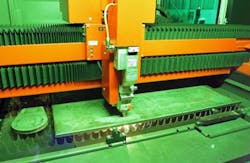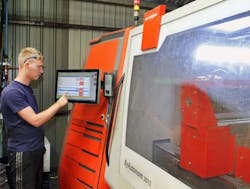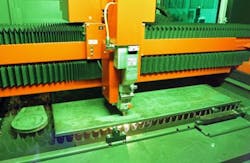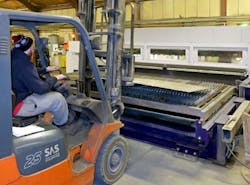Versatile fiber laser has utility in job shop
Crayford, Greater London, England - Sheet and plate metal cutter ML Fabcuts now operates two Bystronic laser cutting machines in its 11,000-sq-ft. factory in Crayford. The most recently installed Bystronic fiber laser profiler, which arrived in November 2014, is an ideal machine for job shops, which seldom know what type of component they will be asked to produce next, so need equipment with maximum versatility to tackle a variety of work.
"The fiber laser is brilliant at cutting thin gauge material of all types," says Matt Levett, [email protected] ML Fabcuts' managing director. "It flies through 1.5mm mild steel at 28 m/min, more than three times faster than our 4.4kW CO2 laser. And it is able to cut reflective materials like aluminum, copper, brass, and bronze. This is the Achilles heel of CO2 machines, which can process aluminum up to 6mm-thick but only 1mm-thick copper, and even then there is a risk of back reflections damaging the expensive optics. The fiber laser profiles 15mm-thick aluminum and 6mm copper without any problems. It doesn't miss a beat. The fiber machine also cuts thicker materials efficiently. For example, it profiles 20mm mild steel at 820 m/min, only slightly slower than our CO2 laser, which achieves 890 m/min.”
There are three power-hungry elements of any laser machine—the fume extractor, the chiller, and the laser generator (in that order). The fume extractor on ML Fabcuts' BySpeed 4020 CO2 machine and BySprint Fiber 3015 both consume the same power by drawing a current of 16A. However, the fiber laser machine's chiller takes far less power, pulling 16 rather than 64A. The biggest saving of all is in generation of the laser beam—64A for the fire vs. 125A for CO2.
During November 2014, the electricity bill for the month was $231 (£150), though the profiler was not in full production. It nevertheless compared very favorably with the average monthly electricity bill of $4629 (£3000) at the company's previous unit in Higham, Kent, where the CO2 laser and a waterjet machine were operated.
"Another reason for the fiber machine being so economical to run is that it goes into standby mode in a couple of seconds when it is not cutting and shuts down completely in 15 seconds, then powers up again as quickly as a laptop," Levett continues. "The machine takes several minutes to go into standby and a quarter of an hour to start and stop, so we never do that in practice."
Further savings come from not having to use resonator gases like CO2, nitrogen, or helium when operating a fiber laser cutter, which requires no gases. Furthermore, the machine can be installed in around 10 days, whereas aligning the mirrors on a CO2 machine and plumbing in all the gases contribute to lengthening the install time by a factor of two or three.
ML Fabcuts produces a lot of stage sets for the film industry. They made the aluminum gates seen in a Harry Potter film. The surround of almost every lift servicing 72 floors in the London Shard was manufactured by the company and other architectural work frequently features in its order book. Network Rail is another regular recipient of electrical products in copper and brass.



